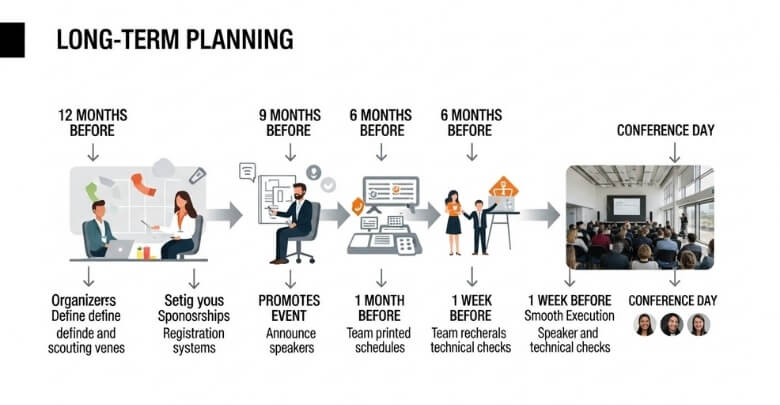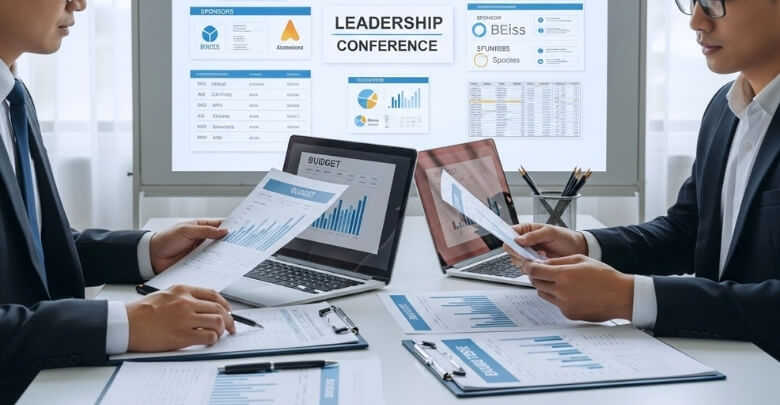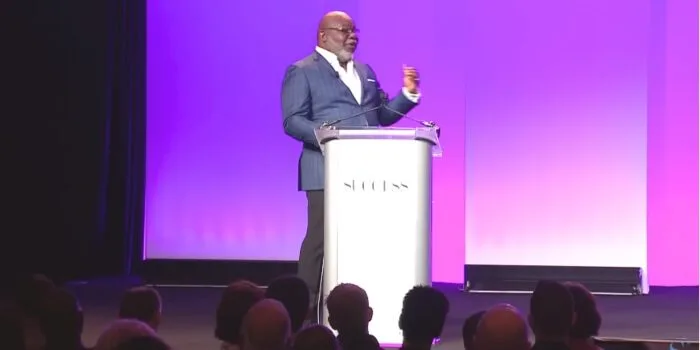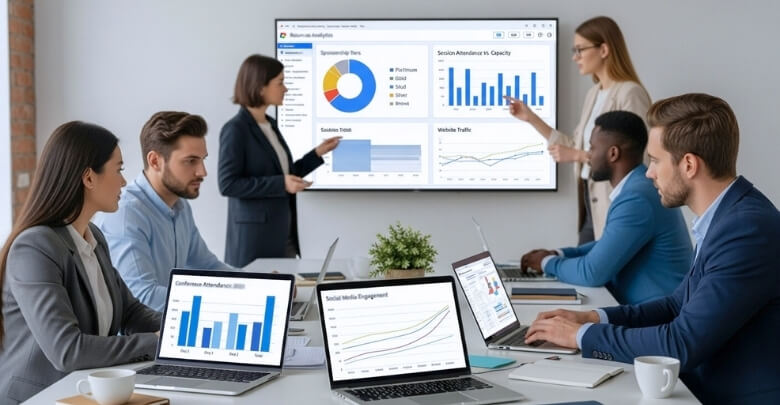Hosting a leadership conference isn’t just about gathering people in a room; it’s about finding ideas, building new connections, and creating a space where future leaders can learn from one another. It’s a chance to leave participants inspired, motivated, and ready to grow. Adding the right energy and structure makes the entire event unforgettable.
So, how do you host a leadership conference? The answer lies in a mix of planning and creativity. From defining clear goals and choosing the right speakers to engaging attendees with interactive sessions, each step matters. Done well, it feels less like organizing an event and more like creating a meaningful experience.
If you’re ready to discover the exact steps to make your conference both smooth and impactful, keep reading this article and learn how to host a leadership conference with confidence and clarity.
How Do You Host a Leadership Conference?
Hosting a leadership conference might sound big, but with the right steps, it’s totally manageable. Think of it as building a meaningful event where leaders come together to share ideas, learn, and connect. Here’s a clear, step-by-step guide to help you make it happen smoothly.
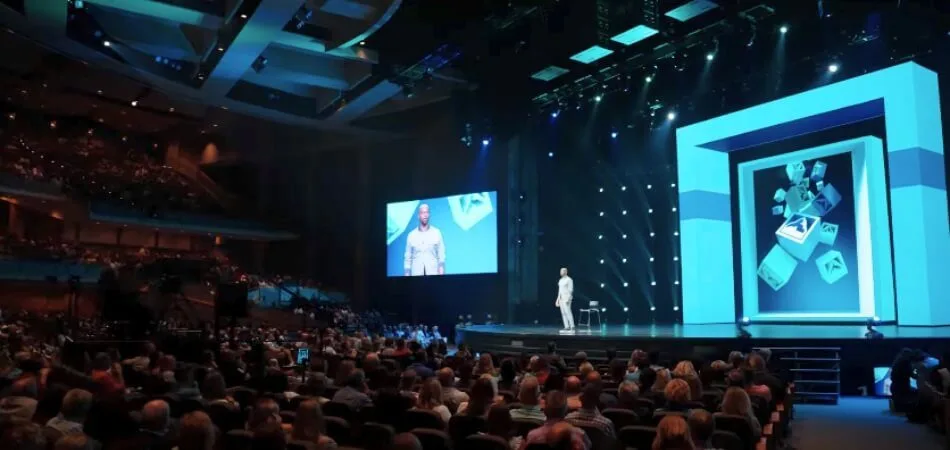
Step 1: Define Goals and Objectives
Every strong conference starts with clear goals. Decide if your focus is inspiring attendees, building new skills, or encouraging networking. These goals shape everything from the agenda to the speakers you invite. When your objectives are set early, the event stays consistent, and attendees walk away with a clear sense of value.
Step 2: Identify Your Audience
Knowing your audience makes planning easier. Think about their roles, industries, and learning needs. A conference for senior managers will look very different from one for young professionals. Knowing what your attendees want helps you create content, sessions, and networking opportunities that truly matter and keep them engaged throughout the event.
Step 3: Confirm Date and Venue/Platform
Pick a date that avoids major holidays or industry clashes. If hosting in person, choose a venue that’s accessible, has suitable seating, and provides good technical facilities. For online or hybrid events, use reliable platforms with interactive features. A well-chosen date and place set the right foundation for the conference’s success.
Step 4: Create a Detailed Agenda
An agenda is the heart of your event. Mix keynote talks with breakout sessions, workshops, and networking breaks to keep things balanced. Attendees value variety and time to connect. A strong leadership conference agenda provides structure, avoids overwhelming participants, and ensures that every session directly supports your event’s goals.
Step 5: Book Speakers and Sponsors
Reach out early to secure strong leadership conference speakers who offer practical insights, not just theory. Make sure they connect with your chosen theme. At the same time, approach potential sponsors with clear value propositions like visibility or branding opportunities. Both elements, good speakers and supportive sponsors, boost your conference’s credibility and long-term impact.
Step 6: Launch Promotion Plan
Start promoting as soon as your basics are in place. Use email lists, LinkedIn, industry partners, or even press mentions to spread the word. Highlight what makes your event unique—maybe it’s a high-profile keynote or exclusive networking. Consistent promotion over weeks builds excitement and increases registration numbers effectively.
Step 7: Open Registration System
Make it simple for people to sign up. Use an online system that collects attendee details, processes payments, and confirms instantly. Keep registration forms short and easy to complete. Early registration discounts or group offers can also encourage people to commit sooner, giving you a better sense of expected turnout.
Step 8: Confirm Logistics (AV, Catering, Transport)
Good logistics make or break an event. Confirm AV setups, test microphones, arrange reliable catering, and organize transport or accommodation options if needed. Small touches, like clear signage or welcome desks, show professionalism. Paying attention to logistics reduces stress on the event day and makes the experience smoother for participants.
Step 9: Rehearse With Team and Speakers
A rehearsal ensures no one is caught off guard. Walk through the agenda with your team and test the equipment with speakers. Confirm their slides or handouts in advance. This step builds confidence, reduces mistakes, and makes the conference feel well-managed when attendees arrive. Preparation here pays off big.
Step 10: Run Event and Follow Up with Survey
On the day, keep things on schedule, engage with attendees, and troubleshoot problems quickly. Afterward, send thank-you notes and a feedback survey. Asking for feedback shows you care and gives insights to improve next time. A solid follow-up keeps connections alive and strengthens your reputation as a capable organizer.
Sample Follow-Up Mail
Here’s a simple example you can adapt and share as a downloadable option:
Subject: Thank You for Joining Our Leadership Conference
Hello [First Name],
Thank you for being part of our Leadership Conference. We hope you enjoyed the sessions and found the discussions valuable. We’d love to hear your thoughts. Please take a moment to complete our short feedback survey here: [Survey Link].
Your input helps us improve future events.
Warm regards,
[Your Name]
[Your Organization]
Hosting a leadership conference isn’t about being perfect; it’s about planning carefully, keeping attendees’ needs in mind, and staying flexible on the day. Whether it’s local gatherings or larger conferences in Canada, the USA, or the UK, this checklist helps you organize an event that feels smooth, professional, and truly meaningful for everyone involved.
Long-term Planning Timeline for Leadership Conferences
Planning a leadership conference works best when you spread the tasks across a full year. Each stage has its own set of priorities, and knowing why the timing matters prevents last-minute stress. Below, we’ll go through each phase step by step.
12 Months Before – Big Picture Stage
Key Tasks: Define the theme, set your goals, create a working budget, and begin scouting venues. This is also the time to secure a tentative date that aligns with your overall vision.
Why It Matters: Early planning gives you flexibility. The best venues and keynote speakers often book out a year in advance, so starting now ensures you won’t be left scrambling for second choices.
9 Months Before – Locking Key Decisions
Key Tasks: Confirm the venue, reach out to potential speakers, and approach sponsors. Draft a rough agenda that outlines major sessions or tracks.
Why It Matters: By this point, availability starts shrinking fast. Securing speakers and sponsors now sets a strong foundation and gives you leverage when promoting the event later.
6 Months Before – Operational Setup
Key Tasks: Finalize speaker commitments, sign sponsorship agreements, and launch your registration system or event website. Begin planning AV needs and catering arrangements.
Why It Matters: This is the stage where plans turn into commitments. Getting these details confirmed early allows your marketing team enough lead time to promote confidently.
3 Months Before – Promotion Push
Key Tasks: Roll out marketing campaigns, announce confirmed speakers, open ticket sales, and highlight key agenda items.
Why It Matters: Interest builds as the event gets closer. Pushing hard on promotion now creates momentum, boosts registrations, and helps you predict final attendance numbers more accurately.
1 Month Before – Final Preparations
Key Tasks: Finalize printed materials, signage, attendee packs, and event schedules. Confirm technical requirements with your AV team and catering menus with vendors.
Why It Matters: Last-minute details can cause stress if left too late. Wrapping them up a month ahead allows room for adjustments without throwing off your schedule.
1 Week Before – Rehearsals and Confirmations
Key Tasks: Rehearse with your team, test all AV equipment, and confirm logistics with speakers and vendors. Send detailed reminders to attendees.
Why It Matters: This week is your safety net. Rehearsals help catch problems before they happen, while clear reminders make attendees feel prepared and welcomed.
Conference Day – Execution
Key Tasks: Oversee setup, greet attendees, keep sessions running on time, and troubleshoot issues quickly.
Why It Matters: This is the payoff of your planning. A smooth experience makes attendees feel valued and keeps the event’s energy high from start to finish.
A timeline like this keeps your planning structured and ensures nothing slips through the cracks. By assigning tasks to the right stage, you’ll reduce stress, secure better opportunities, and deliver a conference that feels professional and well-prepared.
Budget Planning and Sponsorship Strategy
Money plays a big role in how successful your leadership conference turns out. Without a clear budget, costs can quickly get out of control, and without sponsors, you might miss the chance to offset those costs. Let’s break down how to plan your budget and attract sponsors in a way that makes sense.
Main Budget Buckets to Consider
- Venue: This is often the biggest cost. Rental fees depend on location, size, and facilities. Don’t forget extras like security, parking, and insurance, which can sneak into the final bill.
- Catering: Food and drinks leave a lasting impression. Decide early if you’re providing full meals, snacks, or just coffee breaks. Pricing depends on headcount, so make sure it matches your registration expectations.
- Audio-Visual (AV): Good sound and visuals are non-negotiable. Budget for microphones, projectors, screens, live-streaming, or recording if needed. Even small events feel professional when AV runs smoothly.
- Speakers: Some speakers may volunteer, but others expect honoraria or travel reimbursement. Factor in flights, hotels, and ground transport if you’re bringing in people from outside your city.
- Marketing: Promotion takes time and money. Include costs for ads, printed materials, social media boosts, and possibly a marketing team. A good marketing spend often pays off in stronger attendance.
Calculating ROI for Sponsorships
One simple way to check if sponsorships are worth it is by using this quick formula:
ROI = Sponsorship Revenue ÷ Total Event Cost
Example: If your conference costs $20,000 and you raise $10,000 from sponsors, your ROI from sponsorships is 0.5 (or 50%). Higher ratios mean sponsors are covering a bigger share of your event, making it less risky for you.
Sponsorship Tiers
To attract sponsors, create tiered packages that fit different budgets. For example:
- Gold Sponsor: Logo on all materials, speaking slot, and premium booth.
- Silver Sponsor: Logo on program, booth space, shoutout during opening remarks.
- Bronze Sponsor: Logo on website and digital materials only.
Budgeting and sponsorship aren’t the glamorous parts of conference planning, but they’re the backbone that makes everything else possible. With a solid budget and well-structured sponsorship packages, you’ll be able to cover costs, reduce risks, and run a professional event that everyone appreciates.
Key Roles and Responsibilities in a Leadership Conference
Behind every successful leadership conference is a team with clear responsibilities. When roles are well-defined, planning feels easier, and everyone knows what to focus on. Strong leadership conference management ensures these roles stay connected and effective, making the event run smoothly from start to finish.
Organizer
As the overall decision-maker, the organizer manages timelines, budgets, and communication across the team. Their role is to connect all moving parts and ensure the event follows its vision. Without this role, planning can quickly become scattered.
Program Director
The program director shapes the content of the event. They decide the theme, select speakers, and design the agenda. Their goal is to make sessions meaningful and aligned with the audience’s needs, ensuring attendees gain real value from the program.
Logistics Lead
Behind the scenes, the logistics lead takes care of essentials. From venue contracts to catering, seating, and transport, they manage details that affect attendee comfort. Careful planning prevents last-minute issues and keeps the event smooth from start to finish.
Host
Serving as the face of the conference, the host welcomes attendees, introduces speakers, and keeps the schedule on track. A capable host also solves problems quickly, communicates clearly, and creates energy in the room to keep participants engaged.
Marketing Lead
The marketing lead is responsible for getting people in the seats. They run campaigns, manage social media, and design promotional materials. Their efforts make sure the event reaches the right audience and maintains strong visibility before and during the conference.
Tech Lead
On the technical side, the tech lead makes sure everything runs without issues. From microphones and projectors to streaming and recording, they test and monitor systems. This role is crucial for smooth presentations and uninterrupted engagement.
Volunteers
Volunteers provide much-needed support across many areas. They assist with registration, guide attendees, manage materials, and step in when small tasks arise. Their presence helps reduce stress for the core team and makes attendees feel better supported throughout the event.
Clear roles prevent confusion and reduce mistakes during planning and execution. When each person knows what they are responsible for, the team works more effectively, and the entire conference runs with confidence, professionalism, and stronger results for everyone involved.
Conference Format Options
Before setting your plans in stone, it’s important to think about how you want to host your leadership conference. Each format has its own strengths and trade-offs, and the right choice depends on your goals and audience. For in-person events, details like accessibility and appropriate attire for leadership conference sessions also come into play. Let’s look at the main options.
In-person Conferences
- Strong networking opportunities through face-to-face connections, much like what you’d expect at a leadership summit.
- Easier to build trust and engagement during live discussions.
- Higher costs for venue, catering, and travel.
- Limited to people who can attend in person.
Virtual Conferences
- Accessible to attendees anywhere in the world.
- Lower costs with no venue or catering needed.
- Requires a strong tech setup to avoid glitches.
- Networking opportunities are more limited than in-person events.
Hybrid Conferences
- Combines live sessions with online participation.
- Offers flexibility for attendees who cannot travel.
- More complex to manage due to dual setup.
- Higher costs than virtual, but often less than fully in-person.
Choosing the right format helps you balance cost, convenience, and attendee experience. Think about your goals and resources before making the decision, and you’ll set the foundation for a conference that feels effective and well-planned.
Designing Memorable Experiences and Engagement
A leadership conference is more than just a series of talks; it’s about creating moments that participants remember. The way you design interactions can shape how people connect, learn, and stay engaged. Here are a few ideas you can build into your event.
Icebreakers
Start with light activities that help attendees feel comfortable. Quick introductions, small group exercises, or fun challenges can ease tension and set a friendly tone. Icebreakers work best when they are simple, short, and encourage people to talk to someone new.
Live Polls
Adding real-time polls during sessions keeps participants involved. You can ask for opinions, gather feedback, or let the audience vote on discussion topics. Polls make sessions interactive and give speakers valuable insights while attendees feel their input truly matters.
Networking Tools
Encouraging connections is a key part of leadership events. Simple tools like digital networking apps, name badges with QR codes, or designated networking breaks help people start conversations. These small efforts create opportunities for attendees to build long-term professional relationships.
Leadership Labs
Hands-on workshops or “labs” give participants the chance to practice leadership skills in real scenarios. This could mean role-playing, problem-solving challenges, or group projects. Leadership labs move learning beyond theory, making the experience active, practical, and memorable.
When you design engagement into every part of the conference, attendees walk away feeling involved rather than passive. By mixing icebreakers, interactive tools, and practical sessions, your event reflects the same qualities that make good leadership conferences memorable for participants.
Post-event Follow-up and Measuring ROI
A leadership conference doesn’t end when the last session wraps up. What you do afterward can be just as important as the event itself. Post-event actions help you understand attendee satisfaction, measure impact, and prepare for even better results next time. Let’s go through the key areas.
Surveys and Feedback
Key Tasks: Send short, clear surveys to participants within a few days of the event. Include questions about session quality, speaker performance, and overall organization. Tools like Google Forms make it simple for attendees to respond quickly.
Why It Matters: Feedback highlights what worked and what needs improvement. Collecting it right away ensures responses are fresh, honest, and more detailed.
Net Promoter Score (NPS)
Key Tasks: Add one simple NPS question to your survey: “On a scale of 0–10, how likely are you to recommend this conference to a colleague?” Track scores across events for comparison.
Why It Matters: NPS gives a quick measure of attendee loyalty and event reputation. A higher score shows your conference is leaving a lasting positive impression.
Content Repurposing
Key Tasks: Turn recordings, session notes, or speaker slides into fresh content—like blog posts, highlight reels, or social media snippets. Share them with attendees and use them to promote future events.
Why It Matters: Repurposing content extends the life of your conference. It keeps attendees engaged after the event and gives potential new participants a taste of what they missed.
Calculating ROI
Key Tasks: Compare sponsorship revenue, ticket sales, and other income against total event costs. Factor in non-financial returns like brand awareness, leads generated, or new partnerships formed.
Why It Matters: ROI shows whether the conference was worth the investment. A clear report helps you justify costs and improve budgeting for next time.
Following up properly turns an event into a learning tool. Surveys and NPS show what people really think, content repurposing keeps momentum alive, and ROI proves the value. Done together, these steps help you grow stronger with every conference you organize.
Frequently Asked Questions
Even after reading all the steps and strategies, many people still have a few extra questions. Here are some quick answers to things you may be curious about when planning a leadership conference.
How Long Should Each Session in a Leadership Conference Be?
Most sessions work well between 30 and 45 minutes. This keeps attention high without overwhelming attendees. Longer sessions can be used for workshops, but shorter ones work best for talks and panels.
Should I Provide Printed Materials or Go Fully Digital?
It depends on your audience. Printed materials are handy for quick notes, while digital files save costs and are eco-friendly. Offering both options usually keeps everyone comfortable and supported.
How Many People Are Ideal for a Leadership Conference?
There’s no fixed number. Smaller groups of 50–100 allow for stronger networking, while larger events with 300–500 bring more visibility. The “right size” depends on your goals, budget, and venue capacity.
What Kind of Food Works Best for Conferences?
Simple, easy-to-handle meals and snacks work best. Finger foods, boxed lunches, and plenty of coffee or tea keep energy levels up. Avoid overly heavy meals that make attendees feel tired during sessions.
How Early Should I Start Marketing the Conference?
It’s best to begin at least three to four months before the event. Announcing early creates awareness, while regular updates build excitement. Early promotions also give attendees time to arrange travel and schedules.
Should I Give Attendees Any Conference Gifts?
Small, practical items often work well. Things like notebooks, pens, or tote bags are useful and appreciated. Branded gifts also act as reminders of the event long after it’s finished.
Do Leadership Conferences Always Need a Theme?
While not required, a theme helps tie sessions together and gives the event a stronger identity. It also makes marketing easier, as attendees can quickly understand what the event is focused on.
Concluding Lines
Bringing a leadership conference to life takes effort, but the rewards are worth it. It’s a chance to inspire people, create meaningful conversations, and give attendees tools they can carry back into their own work. A well-planned event leaves a lasting impression.
When thinking about how do you host a leadership conference, the answer lies in blending careful organization with engaging experiences. From setting clear goals to following up after the event, every detail matters. Each step adds to the overall success and keeps participants interested from start to finish.
If you’re planning your own event, now is the time to take action. Use these tips, apply the strategies, and design a conference that feels memorable. Start planning today and turn your vision into a successful leadership gathering.


